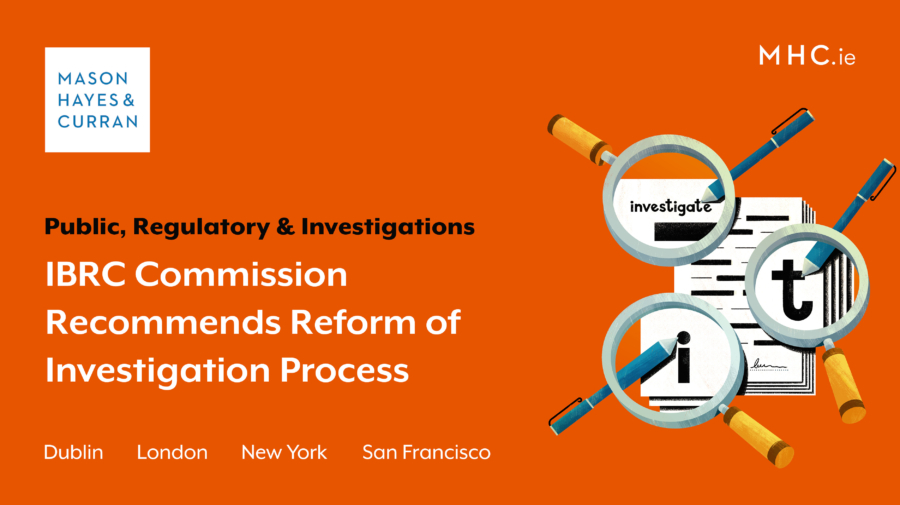IBRC Commission Recommends Reform of Investigation Process

A report by the IBRC Commission criticises the existing Commissions of Investigation process, and offers reform suggestions which the Government has committed to consider. Our Public, Regulatory & Investigations team reviews the recommendations made by the IBRC Commission towards having a more streamlined process.
The IBRC Commission of Investigation, in its final report, has criticised the current Commissions of Investigation's (COI) process and has made suggestions for its reform.
The IBRC Commission was set up in June 2015 to investigate certain matters occurring at the Irish Banking Resolution Corporation (IBRC), beginning with the Siteserv transaction.
The investigation took the Commission seven years to complete. The IBRC Commission has said that it is “now impossible” to conduct an investigation into a matter of urgent public importance expeditiously, while also complying with the “onerous” requirements of fair procedures laid down by the courts, and by the requirements of the Commissions of Investigation Act 2004.
The Commission’s view is that a COI investigating a matter of significant public concern should be able to report within two years. It encountered particular difficulty with its terms of reference, and with the level of fair procedures requirements.
Clear and focused terms of reference
The IBRC Commission recommends that terms of reference set by Government should be:
- Clear and focused, and
- Confined to matters of fact
Proposed terms should be scrutinised by reference to these criteria in consultation with either an ad hoc committee consisting of past chairpersons of commissions/tribunals, or a permanent COI body should one be established.
In this context, the IBRC Commission says that “years” were added to the completion of its report because its terms of reference included the phrase "not commercially sound". The Commission says this was susceptible to different interpretations, both as regards its scope and the relevant applicable standard, and had a broad practical effect in terms of what the Commission had to investigate.
Constitutional justice and fair procedures
The IBRC Commission says that the application of the so-called Re Haughey panoply of rights to COIs in recent times has been “very problematic”, particularly in cases where there is an immense quantity of documentation. It says that in its investigation, the application of the Re Haughey principle required it to ensure that all witnesses were:
- Given a copy of all the evidence, because any part of it might reflect on their good names
- Allowed to cross-examine their “accusers”, ie anyone who gave evidence adverse to them
- Allowed to give rebutting evidence, and
- Permitted to address the Commission by counsel
The Commission adds that the Commissions of Investigation Act 2004 considerably broadens the Re Haughey principle. Its effect in the IBRC investigation was to require the Commission to furnish around 15,000 pages of documents to all relevant parties, and, when taking oral evidence, to put to each relevant witness all evidence given by all other witnesses. It disagrees with the full collection of civil litigation rights being afforded to persons who are only witnesses as to fact before a COI. The Commission also references in this regard the statement of the judge in Menolly Homes v Appeal Commissioners, to the effect that the application of civil hearing procedures to tribunals has resulted in lengthy, contentious and burdensome hearings, and an almost impossible burden being borne by the tribunal body.
It takes the view that a new approach to the requirements of fair procedures should be considered, so that COIs might proceed more quickly. Among its suggestions for a new approach are that:
- The COI issue discovery orders, and obtain documents on discovery
- Discovery documents be circulated to witnesses as the COI deems necessary
- The COI obtain witness statements from relevant witnesses, and share these as appropriate
- The COI take evidence in private, on deposition taken by senior counsel and/or by the sole commission member, to speed up evidence-gathering
- The COI prepare a draft-findings report and circulate this to relevant parties
- Those parties might then make written submissions, present further evidence, and request permission to cross-examine
- The COI schedule further oral hearings for cross-examination and rebuttal evidence, and
- The COI then issue a further draft report, finalise it, and submit it to the Government
Other suggestions
The Commission also suggested several reforms to the 2004 Act, as well as the possibility of establishing a permanent COI body.
Conclusion
The challenges of balancing the urgency of investigations into matters of public importance with the demands of constitutional justice have been highlighted by the Commission's recent report. The public interest in the conduct of timely, thorough investigations into matters of significant public concern often clashes with the complex requirements of fairness under Irish law. However, this report offers a roadmap for a more streamlined process which would seek to accommodate, yet better balance, the public interests and rights concerned. The Government has committed to considering these recommendations, and developments will be keenly awaited.
For more information, contact a member of our Public, Regulatory & Investigations team.
The content of this article is provided for information purposes only and does not constitute legal or other advice.
People also ask
What is the Commission of Investigation into IBRC? |
The IBRC Commission of Investigation was established in June 2015, following consultation with Oireachtas parties, to investigate certain transactions, activities and management decisions at the IBRC, beginning with the Siteserv transaction. |
What is the role of the Commission of Investigation? |
A commission of investigation is one of many bodies available to the government to inquire into various issues. Commissions report findings, give advice and make recommendations. While their findings are not legally binding, they can be highly influential. |
What is the Commission of Investigation Act 2004? |
Legislation under which a commission can be established from time to time to investigate into and report on matters considered to be of significant public concern, to provide for the powers of such commissions and to make provision for related matters. |
Share this:

Catherine Allen
Partner, Head of Public, Regulatory and Investigations
+353 86 382 1009 callen@mhc.ie

